“At 9.45 a.m. each day, more than 1,000 Indian Runner ducks are released for the first of two sorties at South Africa’s Vergenoegd vineyard in Stellenbosch. Their mission: seek and eat thousands of tiny white dune snails feasting on budding vines. “Before we had the ducks we had to put down snail bait, a pesticide. But, for the past nine years I have been here we’ve used very little snail bait, almost nothing, because the ducks eat all the snails and other insects”, said Marlize Jacobs, vintner and horticulturalist. Used for centuries in Asia to control pests, the ducks stand upright like penguins and are slim enough to fit between rows of vines. And they do not waddle, they run. The flock, which started with six ducks in 1983, gives Vergenoegd extra points in the wine industry's sustainability certification process as the 57-hectare vineyard now uses so little chemicals it does not need to declare them, Jacobs said. Parading on the farm each day, the soldier-like birds are guided by a herder and can clear between half a hectare and a whole hectare a day, of the snails that are, besides fungal diseases, considered as the main threat to vines at the farm. “All over the industry and all over the world, dangerous harmful pesticides are being phased out, so I believe one day you will be forced to use alternative methods because pesticides kill all insects, even the friendly insects”, Jacobs said. However, the high costs of keeping the birds are a downside. On a similar sized farm, growers could spend about 50,000 rand ($3,200) a season for pesticides, compared with 30,000 for just a month on ducks, which are kept in protective pens and are fed grain to augment their snail diet, said Jacobs”. – Mike Hutchings and Wendell Roelf via Reuters
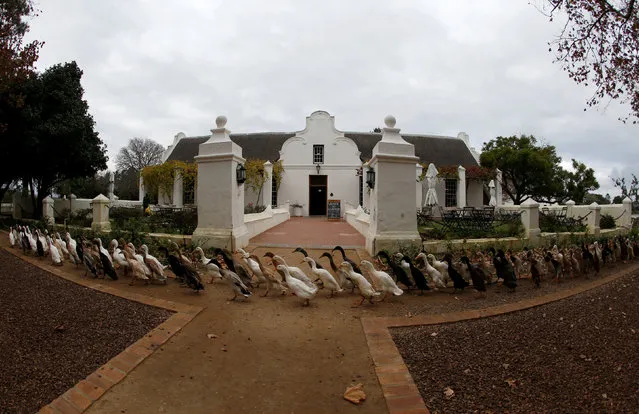
A line of Indian Runner Ducks walk past farm buildings at the Vergenoegd wine estate near Cape Town, South Africa, May 18, 2016. Each day, a quack squad of killer ducks are released for the first of two sorties at South Africa's Vergenoegd wine farm in Stellenbosch. Their mission – seek and destroy thousands of pests out to ruin the season's harvest. Fanning out across the vineyards, some 1,000 Indian Runner ducks hone in on their hidden targets with uncanny precision, locating the tiny white dune snails feasting on budding vines. (Photo by Mike Hutchings/Reuters)
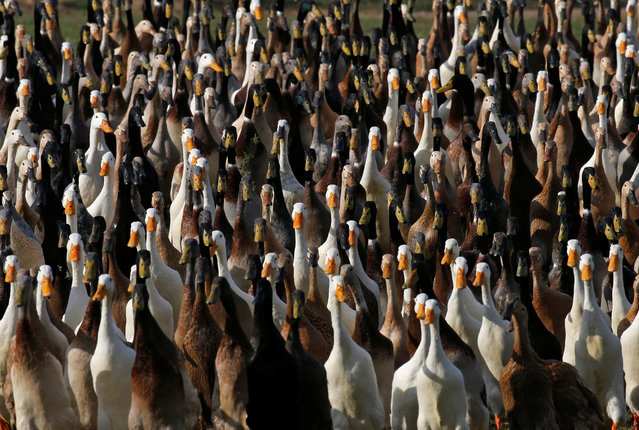
Indian Runner ducks march past farm buildings at the Vergenoegd wine estate near Cape Town, South Africa, May 16, 2016. (Photo by Mike Hutchings/Reuters)
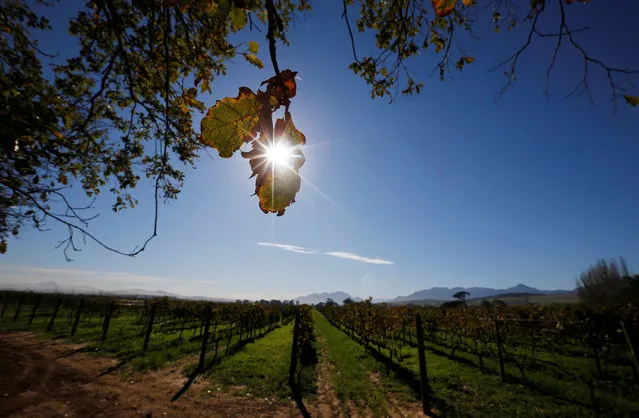
Morning sun shines on vineyards at the Vergenoegd wine estate near Cape Town, South Africa, May 20, 2016. (Photo by Mike Hutchings/Reuters)
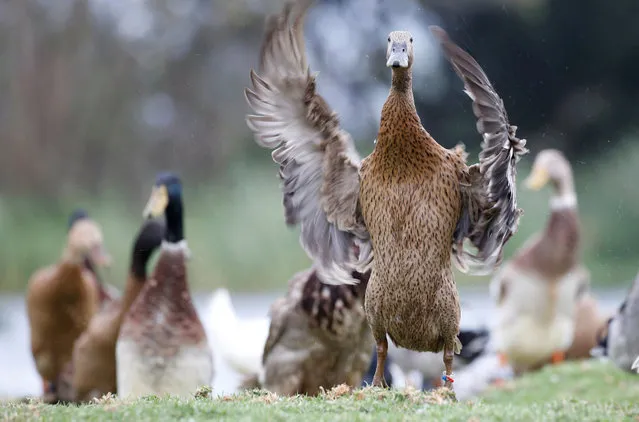
An Indian Runner duck dries off after a swim at a vineyard at the Vergenoegd wine estate near Cape Town, South Africa, May 18, 2016. (Photo by Mike Hutchings/Reuters)
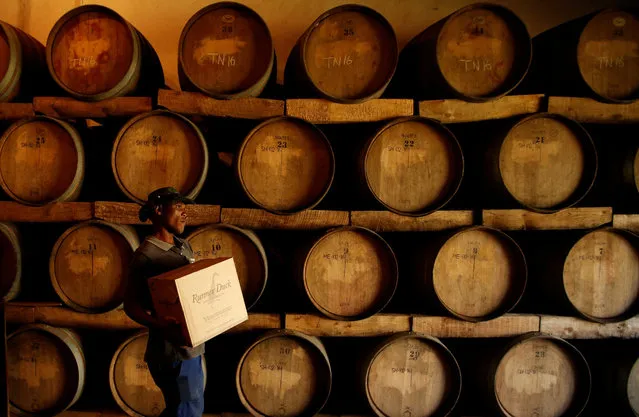
A farmworker carries a box of Runner Duck wine past barrels at the Vergenoegd wine estate near Cape Town, South Africa, May 20, 2016. (Photo by Mike Hutchings/Reuters)
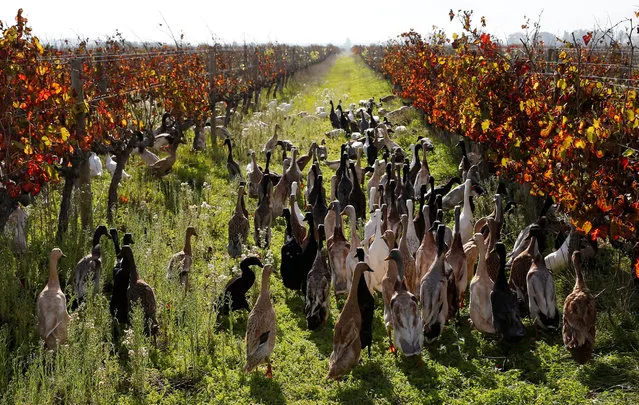
Indian Runner ducks walk through a vineyard at the Vergenoegd wine estate near Cape Town, South Africa, May 16, 2016. (Photo by Mike Hutchings/Reuters)
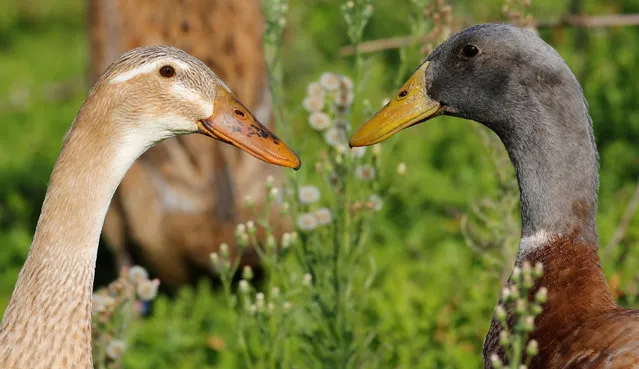
A pair of Indian Runner ducks are seen at a vineyard at the Vergenoegd wine estate near Cape Town, South Africa, May 11, 2016. (Photo by Mike Hutchings/Reuters)
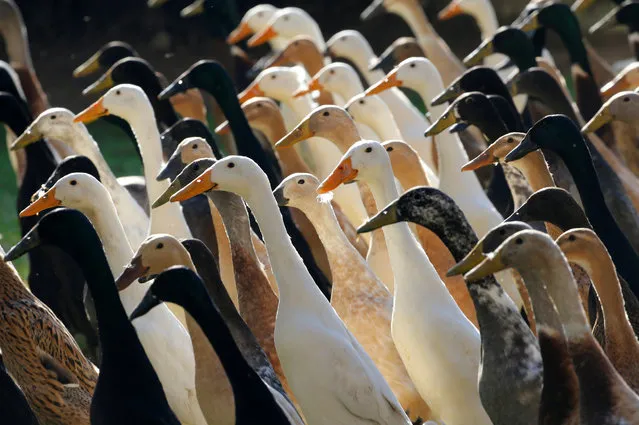
A group of Indian Runner ducks march past farm buildings at the Vergenoegd wine estate near Cape Town, South Africa, May 11, 2016. (Photo by Mike Hutchings/Reuters)

A line of Indian Runner Ducks walk past farm buildings at the Vergenoegd wine estate near Cape Town, South Africa, May 18, 2016. Each day, a quack squad of killer ducks are released for the first of two sorties at South Africa's Vergenoegd wine farm in Stellenbosch. Their mission – seek and destroy thousands of pests out to ruin the season's harvest. Fanning out across the vineyards, some 1,000 Indian Runner ducks hone in on their hidden targets with uncanny precision, locating the tiny white dune snails feasting on budding vines. (Photo by Mike Hutchings/Reuters)

Indian Runner ducks march past farm buildings at the Vergenoegd wine estate near Cape Town, South Africa, May 16, 2016. (Photo by Mike Hutchings/Reuters)

Morning sun shines on vineyards at the Vergenoegd wine estate near Cape Town, South Africa, May 20, 2016. (Photo by Mike Hutchings/Reuters)

An Indian Runner duck dries off after a swim at a vineyard at the Vergenoegd wine estate near Cape Town, South Africa, May 18, 2016. (Photo by Mike Hutchings/Reuters)

A farmworker carries a box of Runner Duck wine past barrels at the Vergenoegd wine estate near Cape Town, South Africa, May 20, 2016. (Photo by Mike Hutchings/Reuters)

Indian Runner ducks walk through a vineyard at the Vergenoegd wine estate near Cape Town, South Africa, May 16, 2016. (Photo by Mike Hutchings/Reuters)

A pair of Indian Runner ducks are seen at a vineyard at the Vergenoegd wine estate near Cape Town, South Africa, May 11, 2016. (Photo by Mike Hutchings/Reuters)

A group of Indian Runner ducks march past farm buildings at the Vergenoegd wine estate near Cape Town, South Africa, May 11, 2016. (Photo by Mike Hutchings/Reuters)
27 May 2016 13:06:00,
post received
0 comments
